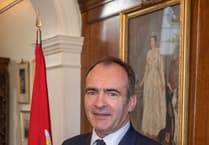Politics across the UK has changed a lot in recent years. At times, the speed of this can feel supersonic.
Last month, Rishi Sunak became the UK’s third prime minister in eight weeks. Fair to say it’s been quite a year in Westminster.
But significant change – events that could cause a firm ripple effect on Manx shores – isn’t exclusive to London. It’s also happening closer to home.
A quarter-century has almost passed since devolution in the UK which, for the first time in generations, saw many powers from Parliament being passed to elected bodies in Edinburgh, Belfast and Cardiff.
Since then, the SNP has risen to unprecedented success in Scotland, and – for the first time in Northern Ireland’s 101-year history – an Irish nationalist party is now the largest at Stormont.
Sinn Féin is also predicted to perform very well in the Irish Republic’s next general election.
The SNP and Sinn Féin have some similarities: they both seek separation from the UK, they’re big supporters of the EU, they enjoy significant backing from young voters and, crucially, both perform strongly at the polls.
Of course, success at the ballot box does not automatically convert to constitutional change.
The criteria for a Northern Ireland secretary of state to call a border poll is vague. If it does happen, it could still be some years away and there would also be no guarantee of a nationalist victory.
In Scotland, the ‘Yes’ vote fell short in 2014. Fifty-five per cent of voters wanted to remain part of the UK.
But that was before Brexit.
For many people across these islands, the result of the 2016 referendum made them look at politics more closely and what it means for their region.
People in the Isle of Man didn’t get to vote but the result meant the island’s relationship with the EU also ceased.
Aspects of employment, freedom of movement and, perhaps, a sense of European identity within the Isle of Man were impacted.
Of course, some people on the island strongly support Brexit and see it a positive move.
So, surrounded by evolving international relations and tied to a country which could change shape one day, where does this leave the Isle of Man?
‘The arc since the 1960s has been constantly towards greater autonomy, and greater independence of Manx institutions from the UK,’ says Peter Edge, originally from Ballasalla and now professor of law at Oxford Brookes University.
‘A change in the territorial reach of the UK is likely to lead to serious reflection on the constitution of the UK. This might well include consideration of the status of the crown dependencies,”’ he adds.
Professor Edge highlights that there’s a political framework already in place if the Isle of Man wanted to pursue greater independence, as laid out in a Council of Ministers report in 2000.
The island’s political status and history are important. Many people claim that Tynwald is the world’s longest-continuing parliament. The Isle of Man could, on paper at least, claim to be the world’s oldest country.
Its constitutional status might not be straightforward, but it is very interesting.
In basic terms, despite a very large amount of autonomy, there is no full Manx independence.
The island is a dependent possession of the British crown which exercises its power on the advice of the UK government, mostly via the Department of Justice.
But to what extent have Manx people had a say in this arrangement?
‘I’m not aware that the people of the Isle of Man have ever voted on the island’s constitutional status,’ says Dr Catriona Mackie who lectures in Manx history and heritage at UCM, a course validated by the University of Chester.
There’s also the growing influence of ‘identity politics’ across these islands. This is when people associate a nationality or culture with a set of political values. For example, a progressive view on social issues and a centre-left economy. It can be a huge factor at the polls.
But, despite the island’s ancient status, is there a broad set of values for what ‘Manx’ means in 2022?
‘What it means to be Manx… is always in a state of flux. As society and culture change, so too does our identity as a nation,’ says Dr Mackie.
‘The island has seen profound social, cultural, and economic changes over the last 150 years, all of which have contributed to new “versions” of Manx identity,’ she adds.
If the Isle of Man wanted a broader reach, it wouldn’t necessarily have to cut its ties to the UK entirely.
‘One model to go further might be a free associate state,’ says Professor Peter Edge.
‘We can see this in, for instance, the relationship of Niue with New Zealand, also in a range of relationships between island states and the USA.’”
A free associate state is similar to a crown dependency, except it might be sovereign: a stand-alone country in its own right with its own citizenship, passport and international relations.
But it has a clear, fixed, working relationship with a bigger, more powerful, country. This arrangement is recognised internationally and the details vary for each agreement.
The Marshall Islands and Palau, for example, are all countries in free association with the United States.
Dr Caroline Morris is from the Centre for Small States at Queen Mary University in London.
She says there are common themes between crown dependencies and free associate states.
‘Both are products of history. The concept of the state of free association was a de-colonial device used and encouraged by the United Nations as a step towards full independence in the post-Second World War era,’ she says.
So, how might the UK react is there were moves by the Isle of Man to seek greater independence?
Of all the talking points surrounding further autonomy for the Isle of Man, it’s perhaps a question rarely considered.
Dr Morris says Westminster would probably be broadly supportive.
‘Typically, the approach of the UK government to its non-sovereign territories has been that they must be able to exercise their right to self-determination and the government will abide by the will of the people in that territory,’ she says.
The likelihood, too, is that a new Isle of Man-UK relationship that left Britain with obligations would need to also take account of the UK’s national interest, as well as the will of the Manx people.
Moves towards greater independence would require much consideration and dialogue, not just from politicians but also within Manx society.
What would the Isle of Man’s relationship with political institutions like the European Union and the United Nations look like?
What would the criteria for Manx citizenship be?
Would the island retain the British monarch as Lord of Mann or have a publicly elected head of state like the Republic of Ireland?
Plenty of questions would need to be worked through.
Manx independence isn’t a new concept. It’s cropped up in conversations from Port Erin to Ramsey and everywhere in between for generations.
But these islands have entered a political era that may see the issue discussed, increasingly, on a more meaningful level.
NOTE
Rick Faragher is a BBC journalist and presenter based in Belfast who began his career at Isle of Man Newspapers. The Onchan man has covered hundreds of stories across Northern Ireland and beyond, including features about the Isle of Man for BBC Breakfast and Football Focus. The 37-year-old also presents live coverage of the TT.




